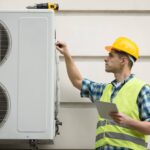Upgrading an HVAC system can be a transformative decision for homeowners, improving comfort, energy efficiency, and long-term cost savings. However, this process involves many considerations, from selecting the right system to understanding the financial and environmental benefits. A thorough understanding of HVAC upgrades ensures informed decisions that cater to your home’s unique needs. We will explore the essential aspects homeowners should know, providing insights into system types, installation requirements, and maintenance to keep your investment running efficiently.
Choosing the Right HVAC System for Your Home
Selecting an HVAC system tailored to your home’s requirements is a critical first step. Homeowners should assess factors such as the size of their home, local climate, and energy goals. Modern systems come in various configurations, including central air conditioning, ductless mini-splits, and heat pumps, each offering unique benefits. Central air systems are ideal for larger homes with existing ductwork, providing consistent temperature control. Ductless mini-splits are highly flexible and efficient, making them suitable for smaller spaces or homes without ducts. Heat pumps can heat and cool and are an excellent choice for moderate climates and energy-conscious homeowners.
Energy efficiency ratings, such as SEER (Seasonal Energy Efficiency Ratio) and HSPF (Heating Seasonal Performance Factor), should also play a role in your decision-making process. Systems with higher ratings typically consume less energy, translating to reduced utility bills and a lower carbon footprint. Consulting with Sarkinen Electrical serving all of Vancouver ensures proper system sizing, avoiding inefficiencies caused by an oversized or undersized unit. You can select an HVAC system that balances comfort, efficiency, and affordability by evaluating your home’s unique characteristics and energy needs.
Understanding Installation and Costs
HVAC upgrades involve more than simply choosing a new system; installation is a significant factor that impacts performance and longevity. A well-installed system optimizes efficiency and minimizes the risk of breakdowns. Homeowners should ensure their contractor performs essential tasks such as inspecting existing ductwork, calculating load requirements, and verifying proper airflow. If your home’s ducts are outdated or poorly sealed, additional repairs or replacements may be necessary to ensure the system operates effectively.
Costs for HVAC upgrades vary widely, influenced by factors such as system type, home size, and additional modifications like ductwork or smart thermostat installation. While the upfront investment may seem significant, many modern systems qualify for rebates, tax credits, or financing options, making upgrades more accessible. It’s also essential to consider lifetime costs, including energy consumption and maintenance. Upgrading to an energy-efficient system often offsets initial expenses through significant savings on monthly utility bills. By understanding installation requirements and associated costs, you can better plan your HVAC upgrade and avoid unexpected expenses.
Incorporating Smart Technology for Improved Efficiency
Integrating smart technology into your HVAC upgrade can greatly enhance system efficiency and convenience. Smart thermostats, for instance, allow homeowners to program temperature settings based on daily routines, ensuring energy isn’t wasted when no one is home. Advanced models learn user preferences over time and adjust settings to maintain optimal comfort. Mobile apps and voice commands further enable remote control of your HVAC system, adding a layer of convenience.
In addition to thermostats, smart zoning systems can direct heating and cooling to specific areas of your home, reducing energy waste. Sensors installed in different rooms detect occupancy and adjust temperatures accordingly, ensuring each space remains comfortable without overworking the system. These technologies reduce energy consumption and extend your HVAC system’s lifespan by preventing unnecessary wear and tear. Incorporating smart solutions into your upgrade benefits your wallet and supports environmental sustainability by reducing overall energy demand.
Importance of Maintenance After an Upgrade
After upgrading your HVAC system, regular maintenance is key to ensuring it operates efficiently for years to come. Routine tasks such as changing filters, cleaning coils, and inspecting ductwork prevent common issues like airflow blockages and system strain. Scheduling professional tune-ups at least twice a year—before the heating and cooling seasons—can help identify potential problems early, reducing the likelihood of costly repairs.
Modern HVAC systems often come with warranties, but failing to perform required maintenance can void these agreements. Keeping detailed records of maintenance services ensures you remain compliant with warranty terms while maintaining optimal performance. Homeowners can also perform tasks like checking thermostat batteries and keeping outdoor units clear of debris. By committing to regular care, you protect your investment and enjoy consistent comfort in your home. A well-maintained system enhances efficiency, contributes to better indoor air quality, and reduces environmental impact.
Maximizing Comfort and Energy Savings
Upgrading your HVAC system presents an opportunity to maximize comfort and energy savings simultaneously. Homeowners can achieve precise temperature control and reduce energy consumption by selecting an energy-efficient system and integrating smart technology. Proper installation ensures the system operates at peak performance, while regular maintenance prolongs its lifespan.
Homeowners can also enhance efficiency by sealing windows and doors, adding insulation, and using energy-efficient window coverings. These measures prevent heat loss in the winter and heat gain in the summer, reducing the workload on the HVAC system. Additionally, ceiling fans can improve air circulation, allowing homeowners to set the thermostat a few degrees higher or lower without sacrificing comfort. Combining a high-quality HVAC upgrade with energy-saving practices allows homeowners to create a more comfortable living environment while significantly lowering energy bills.
HVAC system upgrades invest in your home’s comfort, efficiency, and long-term value. By understanding the factors involved—from selecting the right system to incorporating smart technology and maintaining it regularly—you can make informed decisions that meet your needs and budget. With careful planning and a commitment to maintenance, homeowners can enjoy the benefits of a modern HVAC system while reducing environmental impact and saving on utility costs for years to come.







